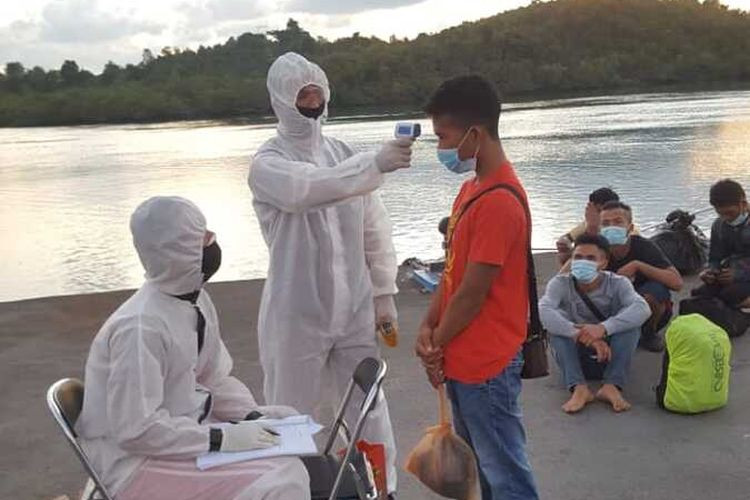Govt blames migrants for 'mudik' virus woes
Minister links recent outbreaks in Riau, Riau Islands to returnees
Change Size

R
ights activists have warned against stigmatizing migrant workers who are returning to Indonesia ahead of the Idul Fitri holiday, with the government appearing to be putting the blame on them for the recent spike in COVID-19 cases in certain regions.
Doing so would only add to the alienation most domestic workers already feel both at home and abroad.
Earlier this week, national COVID-19 task force chief Doni Monardo said that President Joko Widodo had instructed the Indonesian Military (TNI) and the National Police to assist the nearly 50,000 migrant workers who were expected to arrive in the country by the end of this month.
Most of the repatriating workers had expired contracts or stay permits, so had no other option but to return home.
At a press conference on May 3, Coordinating Economic Affairs Minister Airlangga Hartarto said that that a recent influx of returning migrant workers was behind the recent surge in infections in the provinces of Riau and Riau Islands, reported CNN Indonesia.
Official figures show that Riau has more than 5,100 active cases with 925 cases requiring hospital care, which have contributed to bed occupancy rates of 58 percent overall and 59 percent for beds in intensive care units (ICUs). Meanwhile, the Riau Islands has more than 1,700 active cases.
According to the task force, as many as 2,865 of 152,582 returning migrant workers had tested positive for the coronavirus from Dec. 28, 2020 to April 25, 2021. Just over 2,000 of returning workers produced positive results in the initial swab test on arrival, while 860 others tested positive in a second test taken after the mandatory five days in quarantine for all new arrivals.
"Skipping quarantine is dangerous, because if they [...] return to their [hometowns] immediately, their families will become unwitting victims," said Doni.
Although the government has prescribed a mandatory five-day quarantine for all incoming travelers, migrant workers who produce negative test results on their arrival are required to self-isolate for just two days in the provincial capital of their registered domicile, and then another three days once they have returned to their hometowns.
Experts have criticized the shortened quarantine period as lax amid the growing concerns over potentially more transmissible COVID-19 variants. Epidemiologists have maintained calls for a minimum 14 days in quarantine to correspond with the virus’ incubation period, and which is in force in countries like Singapore, South Korea and New Zealand.
The Health Ministry has confirmed the detection of three new coronavirus variants in Indonesia: the United Kingdom, Indian and South African variants, so named for where they were first detected. Three migrant workers who returned from Saudi Arabia have tested positive for the UK variant, also known as B.1.1.7.
Migrant Care executive director Wahyu Susilo pointed out that incidents of health protocol violations in border areas had already undermined the efforts to contain the virus’ spread. He also emphasized that no clusters were detected among the migrant worker community during Idul Fitri last year, despite the more than 170,000 workers who had returned to Indonesia for the holiday.
“There has to be strict supervision, and border control must work with integrity,” Wahyu told The Jakarta Post on [DATE], noting that “we are already dealing with violations this year”.
Most recently, a migrant worker from Lumajang, East Java reportedly tested positive for COVID-19 but was not quarantined, and freely traveled to his hometown on a bus with 31 other returning workers.
Indonesia, which has the highest number of COVID-19 cases in Southeast Asia and is fourth highest among Asia countries according to Worldometer, has a large community of migrant workers. Most are domestic workers who work in close quarters and stigmatized as unskilled labor, and have very few means to secure their livelihood during the pandemic. Many have repatriated due to economic hardship or to avoid penalties for expired work contracts and stay permits in their host country.
But by singling out migrant workers as the source of new infections, the government had only added to the prevailing stigmas against them, said Wahyu.
Migrant workers had been treated with suspicion throughout the pandemic, said Karsiwen, who chairs the Kabar Bumi migrant worker advocacy group that operates in Nusa Tenggara, East Java and Central Java.
“We are always made the scapegoat, we are treated as if we are spreading the virus in our placement countries, and now in Indonesia, we are being treated the same,” she said.









